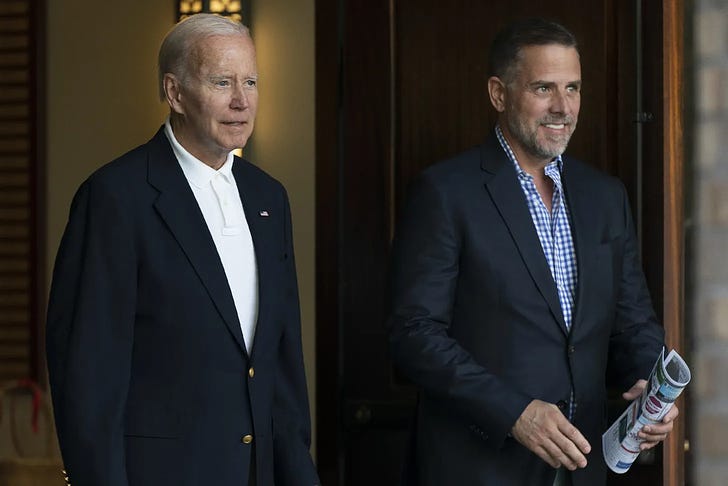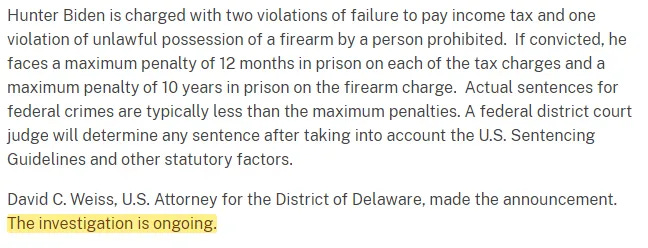Revelations from the testimony of Special Counsel David Weiss
And whether he had "authority" to charge Hunter Biden in DC and California

Ever since explosive whistleblower testimony detailing DOJ efforts to sabotage the Hunter Biden investigation was released this summer, the US Attorney (and now Special Counsel) in charge of that investigation – David Weiss – has been under siege.
Beset with allegations of misconduct by those who had been part of his investigative team, and self-inflicted mistakes such as allowing the statute of limitations on tax crimes to pass, Weiss (who was appointed Special Counsel in August) provided closed-door testimony this week before the House Committee on the Judiciary, led by Jim Jordan.
It was a rare opportunity to obtain testimony from a Special Counsel – they typically only testify after their reports have been completed. And while he refused to answer specifics concerning Hunter’s plea deal, the status of his investigation, and why he allowed the statute of limitations to pass on some of Hunter’s tax crimes, Weiss’s testimony does provide important context regarding what has transpired since his investigation began.
For background, Weiss has investigated Hunter Biden for approximately five years. According to the testimony of whistleblower Gary Shapley, a highly-credentialed IRS Criminal Supervisory Special Agent, this investigation “has been handled differently than any investigation I’ve ever been a part of for the past 14 years of my IRS service.” Agent Shapley explained:
“Some of the decisions seem to be influenced by politics. But whatever the motivations, at every stage decisions were made that had the effect of benefiting the subject of the investigation. These decisions included slow-walking investigative steps, not allowing enforcement actions to be executed, limiting investigators' line of questioning for witnesses, misleading investigators on charging authority, delaying any and all actions months before elections to ensure the investigation did not go overt well before policy memorandum mandated the pause. These are just only a few examples.”
As we noted back in June, the preferential treatment included: denials of normal investigative steps like looking into Hunter Biden’s communications; tipping off the Biden Transition Team that Hunter Biden would be interviewed; and refusing search warrants of Joe Biden’s home, though the Assistant US Attorney (Lesley Wolf) helping with the case admitted it was “likely” there would be evidence.
One of the biggest revelations from the whistleblowers was that Weiss, who was the Delaware US Attorney at the time, was denied authority to file charges against Hunter Biden in DC or California.
During his testimony, Weiss was able to provide some context on how that transpired.
In February of 2022, Weiss reached out to Associate Deputy Attorney General Bradley Weinsheimer “because we were looking to bring certain portions of our investigation to either D.C. or L.A.” In that call, Weiss raised the idea of being granted “Special Attorney” authority, which would have allowed him to bring the charges in those venues.
This requested wasn’t granted by Main Justice. Instead, Weinsheimer told Weiss to reach out to DC (and California) to see if they “would be interested in joining or otherwise participating in the investigation.”
Weiss then reached out to the US Attorneys for DC and the Central District of California (LA) regarding the potential to prosecute Hunter Biden for 2014-2015 tax crimes. These are the years where, according to the testimony of IRS whistleblower Shapley, Hunter Biden undertook a scheme to not report his foreign income from Burisma and “to evade his taxes through a partnership with a convicted felon.”
The US Attorney for DC denied his request: “I received word from my staff that the U.S. Attorney's Office in the District of Columbia had decided not to join the case as a partner or co-counsel moving forward.” (A remarkable declination from DC, considering their zealous prosecutions of January 6 protesters.)
The Central District of California also declined to help pursue the charges.
These denials are important because they were made by political appointees of President Biden. Main Justice, by ordering Weiss to go through this process, put Weiss in a position that he probably didn’t like – that he would have to pursue charges that were denied by other US Attorneys. (Weiss probably imagined the condemnations from the media.)
This left Weiss with a decision: whether to file the DC and California tax charges against Hunter Biden on his own. Weiss would testify that after the DC denial, Main Justice informed him that he had the authority under the “Special Attorney” regulations “to bring whatever charges you deem appropriate.”
Weiss, however, let the statute of limitations expire on Hunter Biden’s 2014 and 2015 tax crimes. Why Weiss decided not to go forward with these charges remains a mystery, especially considering that the DOJ Tax Division (and AUSA Wolf) recommended Biden be prosecuted for these years (see below for reference). Weiss declined to explain his non-prosecution decision, stating he could address this in his report. He was also asked whether it was “fair” that Hunter could avoid paying taxes on his Burisma income. Here’s how that exchange went down:
Q: If over -- in 2014 and 2015, it's been well-established by the whistleblowers, Hunter Biden had in excess of over $1 million in revenue coming in from Burisma that has avoided tax entirely. Do you think it's fair that he is able to avoid paying tax on that gigantic sum of money?
Weiss: Again, that's something I can't comment on. 1 That pertains to the ongoing litigation and our outstanding investigation. I'm just not at liberty to comment at this time, but there will come a time.

He further declined to comment on the significance of the 2014 and 2015 tax years, thus failing to present a rebuttal to Shapley’s whistleblower testimony that “The purposeful exclusion of the 2014 and 2015 years sanitized the most substantive criminal conduct and concealed material facts.”
Weiss also came to the defense of AUSA Lesley Wolf. Shapley had accused Wolf of a number of offenses, including:
considering “optics” in whether to execute the search warrant of Joe Biden’s guest house;
trying to prevent witnesses from asking about Joe Biden’s business dealings with Hunter – “I don’t want to ask about the big guy”;
objecting to search warrants of Hunter Biden’s storage unit (and then notifying Hunter’s attorneys of the unit); and
declining to investigate criminal campaign finance violations.
While Weiss would not get into the specifics of allegations against Wolf, he went on to defend her: “Lesley Wolf has been a dedicated public servant for more than 16 years. I believe she is an excellent lawyer and is a person of integrity.” Yet he didn’t say whether Wolf was still on the case.
What the Future Holds
Weiss also declined to comment on the progress of his investigation. When asked about whether there were any more indictments to come, he responded: “I'm not going to speak to indictments that may be on the horizon or deliberative process or anything in that regard.” He further declined to provide details on the status of Hunter Biden’s pending criminal charges in Delaware.
When asked if he knows when he might complete his task as Special Counsel, Weiss answered:
“I do not as I sit here today, but we will try to move it as quickly as possible without compromising the investigation or the prosecution of any case that might be brought.”
“Any case that might be brought.” We can’t help but think that could include Foreign Agent Registration Act (FARA) charges against Hunter Biden. Recall that after the announcement of Hunter Biden’s plea deal, Weiss announced “the investigation is ongoing.”

FARA charges would be an appropriate course of action for Special Counsel Weiss. As we have explained:
Publicly, much has been disclosed about Hunter Biden’s violation of the Foreign Agent Registration Act (FARA).1 For example, Hunter received millions from CEFC China Energy CO. Ltd. (CEFC), a foreign company that “was an extension of the Chinese government,” to influence US policymakers. Then there are the meetings Hunter arranged with this then-Vice President father on behalf of foreign leaders and the internal e-mails from Hunter Biden’s company regarding the necessity to register under FARA.
Whether those charges will be pursued is an entirely different matter.
Weiss, through his conduct and by his supervision of the Hunter Biden investigation, seems disinterested in pursuing all criminal charges against the President’s son. His testimony makes clear that he - and he alone - was responsible for giving Hunter Biden a pass for his substantial 2014-2015 tax crimes.
Weiss’s record doesn’t inspire confidence moving forward.
According to the DOJ: “FARA requires certain agents of foreign principals who are engaged in political activities or other activities specified under the statute to make periodic public disclosure of their relationship with the foreign principal, as well as activities, receipts and disbursements in support of those activities.”



It certainly pays to be a democrat.
This was all a charade- it was specifically designed to make it look like an effort was being made while at the same time running out the clock on the statute of limitations. The same thing is happening with all the other charges as I write this.